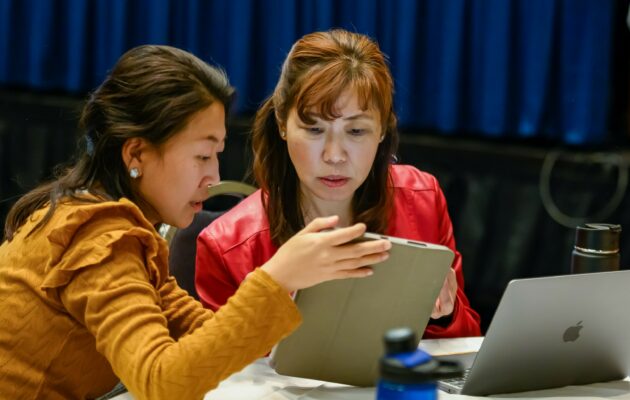Greater access to high-quality language learning at the local, state, and federal levels leads to closer communities, a stronger economy, and greater national security. Any and every time we raise our voices in support of the educators, programs, and policies that promote language learning, we are serving as advocates for language education—and every voice makes a difference.
Advocacy can be as Simple as 1-2-3
Explore the steps below to help support and sustain both local language programs and those across the country!
1. Find Your Voice
Consider the various platforms available to you, from casual speaking opportunities throughout your day (the lunch table or bus stop) to more formal events and outlets (like PTA, school board, or town meetings; professional conferences; and media).
Begin to identify your unique sphere of influence, starting with your personal and professional networks and spanning outward. You’ll want to consider all those in your potential audience who could to help amplify your message.
2. Do Your Research
We rarely have the luxury of knowing how and where our advocacy will unfold, so we need to be ready to speak up when the moment arises. The most effective approach shares a personal, authentic experience paired with key data that will support your claims.
Familiarize yourself with some of the data surrounding the benefits of language learning using reports in the Language Advocacy Research Toolbox found below.
3. Share Your (and Your Networks') Story
Testimonials are a powerful advocacy tool. Check out how language skills have made an impact on the personal, academic, and professional lives of a broad host of multilinguals via the LCF Blog. Then, consider referring a student, language educator, or professional across sectors to be featured next.
Language Advocacy Research Toolbox
Where to begin? Just a few starting places could include…

Making Languages Our Business
Findings demonstrate that language skills are in urgent and rising demand among U.S. employers across industries and functions. Learn why 90 percent of U.S. employers say they rely on individuals with language skills—and explore seven actionable takeaways for businesses.
Take Action
Ready to advocate? Try some of these activities:
- Share your experiences and the data you explore broadly with those in your network.
- Send the Making Languages Our Business report to area reporters and news organizations …or submit an op-ed yourself!
- Work to have your state’s Seal of Biliteracy implemented at local K-12 schools.
- Explore the America the Bilingual podcast for even more outstanding testimonials by multilinguals.
- Educators: Invite national and local policymakers to observe your vibrant language classroom.
- Connect with our friends at JNCL-NCLIS to learn more about legislation affecting language education in your area.
- Write or call a state or national legislator’s office to share findings and show support for bills and resolutions that support language learning.
- Check out resources to start, expand, or save an existing language program via ACTFL's site. For more ideas, please also visit ACTFL’s State Advocacy Goals resource page.
Advocacy is a craft honed with experience: The more you do it, the more natural it becomes. By setting some simple goals, you can start making a difference today—and meeting some amazing fellow advocates in the process.

